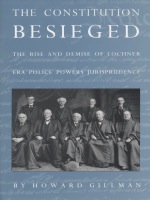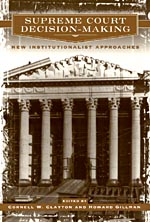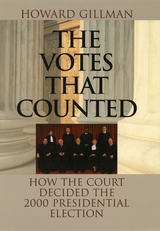3 books about Gillman, Howard

The Constitution Besieged
The Rise & Demise of Lochner Era Police Powers Jurisprudence
Howard Gillman
Duke University Press, 1993
The Constitution Besieged offers a compelling reinterpretation of one of the most notorious periods in American constitutional history. In the decades following the Civil War, federal and state judges struck down as unconstitutional a great deal of innovative social and economic legislation. Scholars have traditionally viewed this as the work of a conservative judiciary more interested in promoting laissez-faire economics than in interpreting the Constitution. Gillman challenges this scholarly orthodoxy by showing how these judges were in fact observing a long-standing constitutional prohibition against "class legislation." Originally published in cloth by Duke University Press, this book received the 1994 C. Herman Pritchett Award for the "Best Book in the Field of Law and Courts," awarded by the Law and Courts Section of the American Political Science Association.
[more]

Supreme Court Decision-Making
New Institutionalist Approaches
Edited by Cornell W. Clayton and Howard Gillman
University of Chicago Press, 1998
What influences decisions of the U.S. Supreme Court? For decades social scientists focused on the ideology of individual justices. Supreme Court Decision Making moves beyond this focus by exploring how justices are influenced by the distinctive features of courts as institutions and their place in the political system.
Drawing on interpretive-historical institutionalism as well as rational choice theory, a group of leading scholars consider such factors as the influence of jurisprudence, the unique characteristics of supreme courts, the dynamics of coalition building, and the effects of social movements. The volume's distinguished contributors and broad range make it essential reading for those interested either in the Supreme Court or the nature of institutional politics.
Original essays contributed by Lawrence Baum, Paul Brace, Elizabeth Bussiere, Cornell Clayton, Sue Davis, Charles Epp, Lee Epstein, Howard Gillman, Melinda Gann Hall, Ronald Kahn, Jack Knight, Forrest Maltzman, David O'Brien, Jeffrey Segal, Charles Sheldon, James Spriggs II, and Paul Wahlbeck.
Drawing on interpretive-historical institutionalism as well as rational choice theory, a group of leading scholars consider such factors as the influence of jurisprudence, the unique characteristics of supreme courts, the dynamics of coalition building, and the effects of social movements. The volume's distinguished contributors and broad range make it essential reading for those interested either in the Supreme Court or the nature of institutional politics.
Original essays contributed by Lawrence Baum, Paul Brace, Elizabeth Bussiere, Cornell Clayton, Sue Davis, Charles Epp, Lee Epstein, Howard Gillman, Melinda Gann Hall, Ronald Kahn, Jack Knight, Forrest Maltzman, David O'Brien, Jeffrey Segal, Charles Sheldon, James Spriggs II, and Paul Wahlbeck.
[more]

The Votes That Counted
How the Court Decided the 2000 Presidential Election
Howard Gillman
University of Chicago Press, 2001
The dramatic struggle over the outcome of the 2000 presidential election presented judges with an extraordinary political challenge, as well as a historic political temptation. In The Votes That Counted Howard Gillman offers a comprehensive yet critical assessment of how well courts coped with the competing expectations for impartial justice and favorable partisan results.
Lively and authoritative, the book documents how the participants, the press, the academic community, and the public responded during these tension-filled thirty-six days. Gillman also provides a serious yet accessible overview of the legal strategies and debates-from briefs and oral arguments to final decisions. However, in explaining the behavior of courts, he moves beyond an analysis of law to also take into account the influences of partisanship, judicial ideology, and broader political and historical contexts.
Appropriately, Gillman pays special attention to the judges whose behavior generated the most controversy—the battling justices of the Florida and United States Supreme Courts. After carefully reviewing the arguments for and against their decisions, he concludes that the five justices behind the Bush v. Gore decision acted outside what should be considered the acceptable boundaries of judicial power. Gillman ends with an analysis of why they chose such an unprecedented course of action and an assessment of whether their partisan intervention will have any lasting effect on the Supreme Court's reputation and authority.
Lively and authoritative, the book documents how the participants, the press, the academic community, and the public responded during these tension-filled thirty-six days. Gillman also provides a serious yet accessible overview of the legal strategies and debates-from briefs and oral arguments to final decisions. However, in explaining the behavior of courts, he moves beyond an analysis of law to also take into account the influences of partisanship, judicial ideology, and broader political and historical contexts.
Appropriately, Gillman pays special attention to the judges whose behavior generated the most controversy—the battling justices of the Florida and United States Supreme Courts. After carefully reviewing the arguments for and against their decisions, he concludes that the five justices behind the Bush v. Gore decision acted outside what should be considered the acceptable boundaries of judicial power. Gillman ends with an analysis of why they chose such an unprecedented course of action and an assessment of whether their partisan intervention will have any lasting effect on the Supreme Court's reputation and authority.
[more]
READERS
Browse our collection.
PUBLISHERS
See BiblioVault's publisher services.
STUDENT SERVICES
Files for college accessibility offices.
UChicago Accessibility Resources
home | accessibility | search | about | contact us
BiblioVault ® 2001 - 2024
The University of Chicago Press









